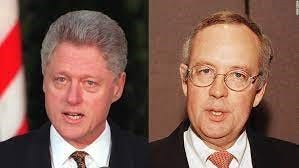Obstruction of Justice, Lying to the FBI and Other Process Crimes: Why Their Prosecutions Often Disappoint
What the Sussman, Libby and Clinton cases have in common and why process crime prosecutions are problematic.
The Sussman Case: Another Dud Process Crime Prosecution
Special Counsel John Durham’s failed $4 million prosecution of Democratic party operative Michael Sussman is another dreary example of the problems with process crime prosecutions. A “process crime” is an offense committed during the investigation of another, usually more serious, crime. Perjury, or lying under oath, is a process crime, as is obstruction of justice and making false statements to federal officials.
Durham’s mission was and is to investigate alleged crimes related to the investigation of Russia’s interference with the 2016 presidential election. Former President Trump said Durham was to, “investigate the investigators.” Durham alleged that Sussman, who claimed extensive connections to FBI officials, did not inform the FBI that he represented the Clinton campaign when he provided information about a possible connection between the Trump campaign and a Russian bank. It was publicly known that Sussman represented the Clinton campaign, but Durham viewed the omission as an indictable offense.
The Sussman case was a classic “swearing contest”—or “he said/she said”—case where the outcome depended on the credibility of a small number of witnesses. The outcome was almost foreordained because of the difficulty in meeting the “beyond a reasonable doubt” standard of proof applicable to criminal cases. The jury deliberated for six hours before it acquitted Sussman.
Today’s question: Why do prosecutors persist in bringing these cases and how should we understand them?
The Statutory Basis for Process Crime Prosecutions
Process crime prosecutions are not new. They arise from the policy, or value, that impeding authorities investigating alleged criminal activity by, for example, lying to the FBI, is as reprehensible as the primary activity being investigated. Section 1001 of Title 18, the federal criminal code, makes process crimes felonies. [1] Section 1001 is very broad. The statute makes false statements or lies to any federal government representative a potential felony.
No sane person would argue that lying to federal investigators should be encouraged. The rule of law depends on processes—investigations and proceedings—that are not corrupted by criminal activity. Most people would agree that charging a process crime that relates directly and substantially to the main crime under investigation is appropriate: if you lie to an FBI agent about robbing a bank that you actually robbed an additional count alleging a violation of Section 1001 seems like a reasonable exercise of prosecutorial discretion. Similarly, if you lie to an FBI agent to provide a false alibi for someone else who robbed a bank a Section 1001 prosecution is appropriate.
Predictable Political Theater
The reactions to process crime verdicts or outcomes are highly predictable forms of political theater and the Sussman case is no exception. Officeholders with a political interest in a conviction often declaim loudly about conspiracies at the highest level of government, the importance of confidence in the judicial system, election integrity, setting an example for American youth, etc. [2]
Those hoping for an acquittal will act as if process crimes, by definition, are trivial matters. Alternatively, as in the Sussman case, process crime proponents will assert that the case was brought for purposes other than obtaining a conviction. In the meantime, millions of dollars are wasted and reputations are damaged.
Why Weaponizing the Criminal Justice System for Political Objectives is a Bad Thing
Problems arise when process crime prosecutions 1) are remote from, or unrelated to, the underlying events which are the basis for a criminal investigation or, 2) relate to events or decisions which are, at their core, political. In other words, if an intelligent nonlawyer can say:
What the heck does [insert process crime] have to do with [insert underlying crime or investigation]?
then it is highly probable that the process crime prosecution will be seen by viewed as unnecessary, overreaching, motivated by politics, or all three. The prosecutors will be seen as a combination of Inspectors Clouseau and Javert and public confidence in the justice system will be further eroded.
The Sussman case is similar in many respects to earlier process crime cases involving former President Bill Clinton and Scooter Libby, formerly Chief of Staff for Vice President Dick Cheney. Clinton was prosecuted as part of Kenneth Starr’s investigation of land transactions in Arkansas known as Whitewater and Libby was prosecuted in connection with an investigation into the leak of the identity of CIA agent Valerie Plame.
These cases are similar, but not identical. Sussman allegedly lied to FBI agents, Clinton allegedly lied in a deposition in a civil case, and Libby allegedly lied to a grand jury. With the passage of time, fundamental truths emerge about each one.
Clinton’s behavior with a White House staffer was disgraceful. However, many Americans were skeptical about a criminal case based on an alleged lie about sex between consenting adults in a civil case that had nothing to do with the allegedly shady Whitewater Arkansas land deals. The Clinton administration was impaired by the perjury prosecution and Clinton sustained lasting reputational damage. Prosecutor Kenneth Starr’s investigation ultimately resulted in Clinton losing his law license and paying a fine.
The Libby case now appears even more unjustified. When FBI agents interviewed Libby they knew that State Department official Richard Armitage had admitted to disclosing Plame’s identity to journalist Robert Novak who published a column outing Plame. The case was solved. Libby never should have been called as a grand jury witness. He could not have had criminal intent with respect to the main investigation—his case was pure “gotcha.” [3]
If Durham does not file charges alleging criminal acts related to the origins of the Russia investigation it will be the Libby case all over again: a process crime prosecution in a situation where no charges were brought alleging an underlying crime, that is, a crime directly related to the central purpose of the investigation.
For some supporters of Durham’s investigation this may not matter. Former Attorney General William Barr and Wall Street Journal columnist Kimberly Strassel reacted to the Sussman verdict by asserting that criminal convictions are not the central purpose of Durham’s investigation. The real purpose, they assert, is to “tell the story” about the Clinton campaign’s alleged dirty tricks, particularly efforts to trigger an investigation into alleged collusion between the Trump campaign and Russia. Thus, Durham seems to be more of a Special Narrator than a Special Prosecutor—his investigation is, in essence, driven by the desire to highlight a political narrative.
“We’ve Spent All this Money—We Better Indict Somebody”
The process crime prosecutions that attract attention originate mostly from special counsels or independent counsels or special prosecutors. [4] Examples include the Watergate Special Prosecutors, Archibald Cox and Leon Jaworski, and Robert Mueller, who investigated Russian interference in the 2016 election. Mueller’s prosecutors pursued process crimes, but Mueller’s team proved, to the satisfaction of reality-based Americans, that Russia really did interfere with a presidential election.
It is not hard to imagine a prosecutor searching for a process crime target, as Durham seems to have done, when the main investigation, which seems to be a political errand rather than an effort to prosecute crimes, is stalled after years of effort and millions of dollars in expense It is a rare prosecutor who can look at a case that has not come together to provide a reasonable chance for a conviction who will file a report that distinguishes between wrong or questionable behaviors and crimes and forego process crime prosecutions.
At Work Again: The Law of Unintended Consequences
Process crime prosecutions are supposed to encourage people to tell the truth to the FBI and other federal investigators. The irony is that any partially-awake lawyer looking at the Clinton, Libby and Sussman prosecutions will advise his or her clients not to talk to federal investigators, including the FBI. There is no penalty for declining to talk to an FBI agent or other federal investigators. If a subpoena is issued, then process crime prosecutions will motivate most people interested in self-preservation to be extremely careful about testifying based on memory and to assert their Fifth Amendment rights.
Process crime convictions also tend to become the subject of pardons which ultimately negate the prosecutor’s work. President George W. Bush commuted Libby’s sentence and President Trump pardoned him. Many Americans effectively pardoned Bill Clinton while Sussman, so far, has had no need for a pardon.
When Prosecutors Should Charge Process Crimes
Every prosecutor confronts two questions in connection with charges against a potential defendant. The first is, “On these facts, can we charge a crime?” or whether the facts contain all the elements of a crime. The second is, “On these facts, should we charge a crime?” The answer to second question requires discretion and depends on several factors. These include the precedent that will be set, whether to allocate resources to a process crime prosecution that could be devoted to matters of more pressing importance, and whether the prosecution will be good for the country, not just serve a partisan political interest.
The test for a process crime prosecution should not be limited to whether the conduct is technically chargeable under Section 1001. Nor should a process crime be charged when there is no prosecution of an underlying crime. Process crime prosecutions that are unconnected to an underlying crime are a symptom of a greater evil. They are the result of the increasing tendency to politicize the criminal justice system for partisan purposes, a use for which these process crime prosecutions show it is dramatically ill-suited.
1. Section 1001 provides:
(a) Except as otherwise provided in this section, whoever, in any matter within the jurisdiction of the executive, legislative, or judicial branch of the Government of the United States, knowingly and willfully—
(1) falsifies, conceals, or covers up by any trick, scheme, or device a material fact;
(2) makes any materially false, fictitious, or fraudulent statement or representation; or
(3) makes or uses any false writing or document knowing the same to contain any materially false, fictitious, or fraudulent statement or entry;
shall be fined under this title, imprisoned not more than 5 years or, if the offense involves international or domestic terrorism (as defined in section 2331), imprisoned not more than 8 years, or both.
2. An interesting party game might be to name the politicians who have been on both sides of these issues. For example, how many of the House Managers in the Clinton impeachment who were stalwart defenders of the rule of law and especially vigilant about the evils of perjury dismissed later perjury or obstruction of justice charges during the Trump Administration as “mere process crimes”?
3. There is a very technical argument that Libby could have had criminal intent with respect to the disclosure of Plame’s identity because he was alleged to have disclosed it to New York Times reporter Judith Miller who never published it. Thus, an element of the crime—the public disclosure of the identity of a CIA agent—is arguably missing. In any event, Armitage, who was never prosecuted, acknowledged his disclosure of Plame’s identity and Novak was the means of its publication.
4. There are technical differences between these terms but each involves lawyers appointed to investigate specific facts outside normal Justice Department processes. The history of these investigations shows that they can be lengthy, expensive and range far beyond their original scope. An example might be Lawrence Walsh’s interminable investigation of the Iran-Contra Affair during the Reagan and George H.W. Bush administrations.
Acknowledgments:
Special thanks to Ed Huddleson and Mike Connelly for their assistance with this post.









“Reality-based Americans” is a phrase I am going to have to work into my everyday conversations! Great post.